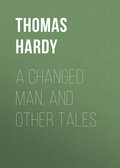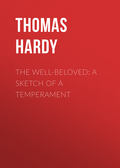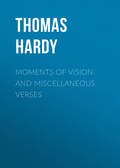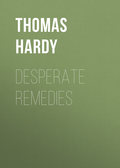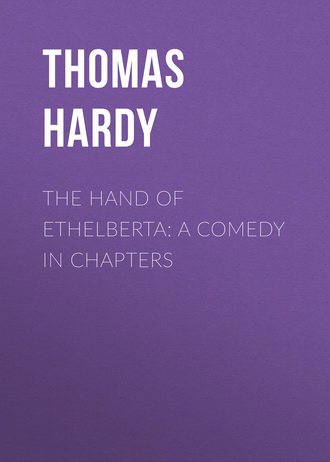
Томас Харди (Гарди)
The Hand of Ethelberta: A Comedy in Chapters
26. ETHELBERTA’S DRAWING-ROOM
While Ethelberta during the next few days was dismissing that evening journey from her consideration, as an incident altogether foreign to the organized course of her existence, the hidden fruit thereof was rounding to maturity in a species unforeseen.
Inferences unassailable as processes, are, nevertheless, to be suspected, from the almost certain deficiency of particulars on some side or other. The truth in relation to Neigh’s supposed frigidity was brought before her at the end of the following week, when Dan and Sol had taken Picotee, Cornelia, and the young children to Kew for the afternoon.
Early that morning, hours before it was necessary, there had been such a chatter of preparation in the house as was seldom heard there. Sunday hats and bonnets had been retrimmed with such cunning that it would have taken a milliner’s apprentice at least to discover that any thread in them was not quite new. There was an anxious peep through the blind at the sky at daybreak by Georgina and Myrtle, and the perplexity of these rural children was great at the weather-signs of the town, where atmospheric effects had nothing to do with clouds, and fair days and foul came apparently quite by chance. Punctually at the hour appointed two friendly human shadows descended across the kitchen window, followed by Sol and Dan, much to the relief of the children’s apprehensions that they might forget the day.
The brothers were by this time acquiring something of the airs and manners of London workmen; they were less spontaneous and more comparative; less genial, but smarter; in obedience to the usual law by which the emotion that takes the form of humour in country workmen becomes transmuted to irony among the same order in town. But the fixed and dogged fidelity to one another under apparent coolness, by which this family was distinguished, remained unshaken in these members as in all the rest, leading them to select the children as companions in their holiday in preference to casual acquaintance. At last they were ready, and departed, and Ethelberta, after chatting with her mother awhile, proceeded to her personal duties.
The house was very silent that day, Gwendoline and Joey being the only ones left below stairs. Ethelberta was wishing that she had thrown off her state and gone to Kew to have an hour of childhood over again in a romp with the others, when she was startled by the announcement of a male visitor – none other than Mr. Neigh.
Ethelberta’s attitude on receipt of this information sufficiently expressed a revived sense that the incidence of Mr. Neigh on her path might have a meaning after all. Neigh had certainly said he was going to marry her, and now here he was come to her house – just as if he meant to do it forthwith. She had mentally discarded him; yet she felt a shock which was scarcely painful, and a dread which was almost exhilarating. Her flying visit to Farnfield she thought little of at this moment. From the fact that the mind prefers imaginings to recapitulation, conjecture to history, Ethelberta had dwelt more upon Neigh’s possible plans and anticipations than upon the incidents of her evening journey; and the former assumed a more distinct shape in her mind’s eye than anything on the visible side of the curtain.
Neigh was perhaps not quite so placidly nonchalant as in ordinary; still, he was by far the most trying visitor that Ethelberta had lately faced, and she could not get above the stage – not a very high one for the mistress of a house – of feeling her personality to be inconveniently in the way of his eyes. He had somewhat the bearing of a man who was going to do without any fuss what gushing people would call a philanthropic action.
‘I have been intending to write a line to you,’ said Neigh; ‘but I felt that I could not be sure of writing my meaning in a way which might please you. I am not bright at a letter – never was. The question I mean is one that I hope you will be disposed to answer favourably, even though I may show the awkwardness of a fellow-person who has never put such a question before. Will you give me a word of encouragement – just a hope that I may not be unacceptable as a husband to you? Your talents are very great; and of course I know that I have nothing at all in that way. Still people are happy together sometimes in spite of such things. Will you say “Yes,” and settle it now?’
‘I was not expecting you had come upon such an errand as this,’ said she, looking up a little, but mostly looking down. ‘I cannot say what you wish, Mr. Neigh.
‘Perhaps I have been too sudden and presumptuous. Yes, I know I have been that. However, directly I saw you I felt that nobody ever came so near my idea of what is desirable in a lady, and it occurred to me that only one obstacle should stand in the way of the natural results, which obstacle would be your refusal. In common kindness consider. I daresay I am judged to be a man of inattentive habits – I know that’s what you think of me; but under your influence I should be very different; so pray do not let your dislike to little matters influence you.’
‘I would not indeed. But believe me there can be no discussion of marriage between us,’ said Ethelberta decisively.
‘If that’s the case I may as well say no more. To burden you with my regrets would be out of place, I suppose,’ said Neigh, looking calmly out of the window.
‘Apart from personal feeling, there are considerations which would prevent what you contemplated,’ she murmured. ‘My affairs are too lengthy, intricate, and unpleasant for me to explain to anybody at present. And that would be a necessary first step.’
‘Not at all. I cannot think that preliminary to be necessary at all. I would put my lawyer in communication with yours, and we would leave the rest to them: I believe that is the proper way. You could say anything in confidence to your family-man; and you could inquire through him anything you might wish to know about my – about me. All you would need to say to myself are just the two little words – “I will,” in the church here at the end of the Crescent.’
‘I am sorry to pain you, Mr. Neigh – so sorry,’ said Ethelberta. ‘But I cannot say them.’ She was rather distressed that, despite her discouraging words, he still went on with his purpose, as if he imagined what she so distinctly said to be no bar, but rather a stimulant, usual under the circumstances.
‘It does not matter about paining me,’ said Neigh. ‘Don’t take that into consideration at all. But I did not expect you to leave me so entirely without help – to refuse me absolutely as far as words go – after what you did. If it had not been for that I should never have ventured to call. I might otherwise have supposed your interest to be fixed in another quarter; but your acting in that manner encouraged me to think you could listen to a word.’
‘What do you allude to?’ said Ethelberta. ‘How have I acted?’
Neigh appeared reluctant to go any further; but the allusion soon became sufficiently clear. ‘I wish my little place at Farnfield had been worthier of you,’ he said brusquely. ‘However, that’s a matter of time only. It is useless to build a house there yet. I wish I had known that you would be looking over it at that time of the evening. A single word, when we were talking about it the other day, that you were going to be in the neighbourhood, would have been sufficient. Nothing could have given me so much delight as to have driven you round.’
He knew that she had been to Farnfield: that knowledge was what had inspired him to call upon her to-day! Ethelberta breathed a sort of exclamation, not right out, but stealthily, like a parson’s damn. Her face did not change, since a face must be said not to change while it preserves the same pleasant lines in the mobile parts as before; but anybody who has preserved his pleasant lines under the half-minute’s peer of the invidious camera, and found what a wizened, starched kind of thing they stiffen to towards the end of the time, will understand the tendency of Ethelberta’s lovely features now.
‘Yes; I walked round,’ said Ethelberta faintly.
Neigh was decidedly master of the position at last; but he spoke as if he did not value that. His knowledge had furnished him with grounds for calling upon her, and he hastened to undeceive her from supposing that he could think ill of any motive of hers which gave him those desirable grounds.
‘I supposed you, by that, to give some little thought to me occasionally,’ he resumed, in the same slow and orderly tone. ‘How could I help thinking so? It was your doing that which encouraged me. Now, was it not natural – I put it to you?’
Ethelberta was almost exasperated at perceiving the awful extent to which she had compromised herself with this man by her impulsive visit. Lightly and philosophically as he seemed to take it – as a thing, in short, which every woman would do by nature unless hindered by difficulties – it was no trifle to her as long as he was ignorant of her justification; and this she determined that he should know at once, at all hazards.
‘It was through you in the first place that I did look into your grounds!’ she said excitedly. ‘It was your presumption that caused me to go there. I should not have thought of such a thing else. If you had not said what you did say I never should have thought of you or Farnfield either – Farnfield might have been in Kamtschatka for all I cared.’
‘I hope sincerely that I never said anything to disturb you?’
‘Yes, you did – not to me, but to somebody,’ said Ethelberta, with her eyes over-full of retained tears.
‘What have I said to somebody that can be in the least objectionable to you?’ inquired Neigh, with much concern.
‘You said – you said, you meant to marry me – just as if I had no voice in the matter! And that annoyed me, and made me go there out of curiosity.’
Neigh changed colour a little. ‘Well, I did say it: I own that I said it,’ he replied at last. Probably he knew enough of her nature not to feel long disconcerted by her disclosure, however she might have become possessed of the information. The explanation was certainly a great excuse to her curiosity; but if Ethelberta had tried she could not have given him a better ground for making light of her objections to his suit. ‘I felt that I must marry you, that we were predestined to marry ages ago, and I feel it still!’ he continued, with listless ardour. ‘You seem to regret your interest in Farnfield; but to me it is a charm, and has been ever since I heard of it.’
‘If you only knew all!’ she said helplessly, showing, without perceiving it, an unnecessary humility in the remark, since there was no more reason just then that she should go into details about her life than that he should about his. But melancholy and mistaken thoughts of herself as a counterfeit had brought her to this.
‘I do not wish to know more,’ said Neigh.
‘And would you marry any woman off-hand, without being thoroughly acquainted with her circumstances?’ she said, looking at him curiously, and with a little admiration, for his unconscionably phlegmatic treatment of her motives in going to Farnfield had a not unbecoming daring about it in Ethelberta’s eye.
‘I would marry a woman off-hand when that woman is you. I would make you mine this moment did I dare; or, to speak with absolute accuracy, within twenty-four hours. Do assent to it, dear Mrs. Petherwin, and let me be sure of you for ever. I’ll drive to Doctors’ Commons this minute, and meet you to-morrow morning at nine in the church just below. It is a simple impulse, but I would adhere to it in the coolest moment. Shall it be arranged in that way, instead of our waiting through the ordinary routine of preparation? I am not a youth now, but I can see the bliss of such an act as that, and the contemptible nature of methodical proceedings beside it!’
He had taken her hand. Ethelberta gave it a subtle movement backwards to imply that he was not to retain the prize, and said, ‘One whose inner life is almost unknown to you, and whom you have scarcely seen except at other people’s houses!’
‘We know each other far better than we may think at first,’ said Neigh. ‘We are not people to love in a hurry, and I have not done so in this case. As for worldly circumstances, the most important items in a marriage contract are the persons themselves, and, as far as I am concerned, if I get a lady fair and wise I care for nothing further. I know you are beautiful, for all London owns it; I know you are talented, for I have read your poetry and heard your romances; and I know you are politic and discreet – ’
‘For I have examined your property,’ said she, with a weak smile.
Neigh bowed. ‘And what more can I wish to know? Come, shall it be?’
‘Certainly not to-morrow.’
‘I would be entirely in your hands in that matter. I will not urge you to be precipitate – I could not expect you to be ready yet. My suddenness perhaps offended you; but, having thought deeply of this bright possibility, I was apt to forget the forbearance that one ought to show at first in mentioning it. If I have done wrong forgive me.’
‘I will think of that,’ said Ethelberta, with a cooler manner. ‘But seriously, all these words are nothing to the purpose. I must remark that I prize your friendship, but it is not for me to marry now. You have convinced me of your goodness of heart and freedom from unworthy suspicions; let that be enough. The best way in which I in my turn can convince you of my goodness of heart is by asking you to see me in private no more.’
‘And do you refuse to think of me as – . Why do you treat me like that, after all?’ said Neigh, surprised at this want of harmony with his principle that one convert to matrimony could always find a second ready-made.
‘I cannot explain, I cannot explain,’ said she, impatiently. ‘I would and I would not – explain I mean, not marry. I don’t love anybody, and I have no heart left for beginning. It is only honest in me to tell you that I am interested in watching another man’s career, though that is not to the point either, for no close relationship with him is contemplated. But I do not wish to speak of this any more. Do not press me to it.’
‘Certainly I will not,’ said Neigh, seeing that she was distressed and sorrowful. ‘But do consider me and my wishes; I have a right to ask it for it is only asking a continuance of what you have already begun to do. To-morrow I believe I shall have the happiness of seeing you again.’
She did not say no, and long after the door had closed upon him she remained fixed in thought. ‘How can he be blamed for his manner,’ she said, ‘after knowing what I did!’
Ethelberta as she sat felt herself much less a Petherwin than a Chickerel, much less a poetess richly freighted with fancy than an adventuress with a nebulous prospect. Neigh was one of the few men whose presence seemed to attenuate her dignity in some mysterious way to its very least proportions; and that act of espial, which had so quickly and inexplicably come to his knowledge, helped his influence still more. She knew little of the nature of the town bachelor; there were opaque depths in him which her thoughts had never definitely plumbed. Notwithstanding her exaltation to the atmosphere of the Petherwin family, Ethelberta was very far from having the thoroughbred London woman’s knowledge of sets, grades, coteries, cliques, forms, glosses, and niceties, particularly on the masculine side. Setting the years from her infancy to her first look into town against those linking that epoch with the present, the former period covered not only the greater time, but contained the mass of her most vivid impressions of life and its ways. But in recognizing her ignorance of the ratio between words to women and deeds to women in the ethical code of the bachelor of the club, she forgot that human nature in the gross differs little with situation, and that a gift which, if the germs were lacking, no amount of training in clubs and coteries could supply, was mother-wit like her own.
27. MRS. BELMAINE’S – CRIPPLEGATE CHURCH
Neigh’s remark that he believed he should see Ethelberta again the next day referred to a contemplated pilgrimage of an unusual sort which had been arranged for that day by Mrs. Belmaine upon the ground of an incidental suggestion of Ethelberta’s. One afternoon in the week previous they had been chatting over tea at the house of the former lady, Neigh being present as a casual caller, when the conversation was directed upon Milton by somebody opening a volume of the poet’s works that lay on a table near.
‘Milton! thou shouldst be living at this hour:
England hath need of thee – ’
said Mrs. Belmaine with the degree of flippancy which is considered correct for immortal verse, the Bible, God, etc., in these days. And Ethelberta replied, lit up by a quick remembrance, ‘It is a good time to talk of Milton; for I have been much impressed by reading the “Life;” and I have decided to go and see his tomb. Could we not all go? We ought to quicken our memories of the great, and of where they lie, by such a visit occasionally.’
‘We ought,’ said Mrs. Belmaine.
‘And why shouldn’t we?’ continued Ethelberta, with interest.
‘To Westminster Abbey?’ said Mr. Belmaine, a common man of thirty, younger than his wife, who had lately come into the room.
‘No; to where he lies comparatively alone – Cripplegate Church.’
‘I always thought that Milton was buried in Poet’s Corner,’ said Mr. Belmaine.
‘So did I,’ said Neigh; ‘but I have such an indifferent head for places that my thinking goes for nothing.’
‘Well, it would be a pretty thing to do,’ said Mrs. Belmaine, ‘and instructive to all of us. If Mrs. Petherwin would like to go, I should. We can take you in the carriage and call round for Mrs. Doncastle on our way, and set you both down again coming back.’
‘That would be excellent,’ said Ethelberta. ‘There is nowhere I like going to so much as the depths of the city. The absurd narrowness of world-renowned streets is so surprising – so crooked and shady as they are too, and full of the quaint smells of old cupboards and cellars. Walking through one of them reminds me of being at the bottom of some crevasse or gorge, the proper surface of the globe being the tops of the houses.’
‘You will come to take care of us, John? And you, Mr. Neigh, would like to come? We will tell Mr. Ladywell that he may join us if he cares to,’ said Mrs. Belmaine.
‘O yes,’ said her husband quietly; and Neigh said he should like nothing better, after a faint aspect of apprehension at the remoteness of the idea from the daily track of his thoughts. Mr. Belmaine observing this, and mistaking it for an indication that Neigh had been dragged into the party against his will by his over-hasty wife, arranged that Neigh should go independently and meet them there at the hour named if he chose to do so, to give him an opportunity of staying away. Ethelberta also was by this time doubting if she had not been too eager with her proposal. To go on such a sentimental errand might be thought by her friends to be simply troublesome, their adherence having been given only in the regular course of complaisance. She was still comparatively an outsider here, her life with Lady Petherwin having been passed chiefly in alternations between English watering-places and continental towns. However, it was too late now to muse on this, and it may be added that from first to last Ethelberta never discovered from the Belmaines whether her proposal had been an infliction or a charm, so perfectly were they practised in sustaining that complete divorce between thinking and saying which is the hall-mark of high civilization.
But, however she might doubt the Belmaines, she had no doubt as to Neigh’s true sentiments: the time had come when he, notwithstanding his air of being oppressed by almost every lively invention of town and country for charming griefs to rest, would not be at all oppressed by a quiet visit to the purlieus of St Giles’s, Cripplegate, since she was the originator, and was going herself.
It was a bright hope-inspiring afternoon in this mid-May time when the carriage containing Mr. and Mrs. Belmaine, Mrs. Doncastle, and Ethelberta, crept along the encumbered streets towards Barbican; till turning out of that thoroughfare into Redcross Street they beheld the bold shape of the old tower they sought, clothed in every neutral shade, standing clear against the sky, dusky and grim in its upper stage, and hoary grey below, where every corner of every stone was completely rounded off by the waves of wind and storm.
All people were busy here: our visitors seemed to be the only idle persons the city contained; and there was no dissonance – there never is – between antiquity and such beehive industry; for pure industry, in failing to observe its own existence and aspect, partakes of the unobtrusive nature of material things. This intra-mural stir was a flywheel transparent by excessive motion, through which Milton and his day could be seen as if nothing intervened. Had there been ostensibly harmonious accessories, a crowd of observing people in search of the poetical, conscious of the place and the scene, what a discord would have arisen there! But everybody passed by Milton’s grave except Ethelberta and her friends, and for the moment the city’s less invidious conduct appeared to her more respectful as a practice than her own.
But she was brought out of this rumination by the halt at the church door, and completely reminded of the present by finding the church open, and Neigh – the, till yesterday, unimpassioned Neigh – waiting in the vestibule to receive them, just as if he lived there. Ladywell had not arrived. It was a long time before Ethelberta could get back to Milton again, for Neigh was continuing to impend over her future more and more visibly. The objects along the journey had distracted her mind from him; but the moment now was as a direct renewal and prolongation of the declaration-time yesterday, and as if in furtherance of the conclusion of the episode.
They all alighted and went in, the coachman being told to take the carriage to a quiet nook further on, and return in half-an-hour. Mrs. Belmaine and her carriage some years before had accidentally got jammed crosswise in Cheapside through the clumsiness of the man in turning up a side street, blocking that great artery of the civilized world for the space of a minute and a half, when they were pounced upon by half-a-dozen policemen and forced to back ignominiously up a little slit between the houses where they did not mean to go, amid the shouts of the hindered drivers; and it was her nervous recollection of that event which caused Mrs. Belmaine to be so precise in her directions now.
By the time that they were grouped around the tomb the visit had assumed a much more solemn complexion than any one among them had anticipated. Ashamed of the influence that she discovered Neigh to be exercising over her, and opposing it steadily, Ethelberta drew from her pocket a small edition of Milton, and proposed that she should read a few lines from ‘Paradise Lost.’ The responsibility of producing a successful afternoon was upon her shoulders; she was, moreover, the only one present who could properly manage blank verse, and this was sufficient to justify the proposal.
She stood with her head against the marble slab just below the bust, and began a selected piece, Neigh standing a few yards off on her right looking into his hat in order to listen accurately, Mr. and Mrs. Belmaine and Mrs. Doncastle seating themselves in a pew directly facing the monument. The ripe warm colours of afternoon came in upon them from the west, upon the sallow piers and arches, and the infinitely deep brown pews beneath, the aisle over Ethelberta’s head being in misty shade through which glowed a lurid light from a dark-stained window behind. The sentences fell from her lips in a rhythmical cadence one by one, and she could be fancied a priestess of him before whose image she stood, when with a vivid suggestiveness she delivered here, not many yards from the central money-mill of the world, yet out from the very tomb of their author, the passage containing the words:
‘Mammon led them on;
Mammon, the least erected spirit that fell
From heaven.’
When she finished reading Ethelberta left the monument, and then each one present strayed independently about the building, Ethelberta turning to the left along the passage to the south door. Neigh – from whose usually apathetic face and eyes there had proceeded a secret smouldering light as he listened and regarded her – followed in the same direction and vanished at her heels into the churchyard, whither she had now gone. Mr. and Mrs. Belmaine exchanged glances, and instead of following the pair they went with Mrs. Doncastle into the vestry to inquire of the person in charge for the register of the marriage of Oliver Cromwell, which was solemnized here. The church was now quite empty, and its stillness was as a vacuum into which an occasional noise from the street overflowed and became rarefied away to nothing.
Something like five minutes had passed when a hansom stopped outside the door, and Ladywell entered the porch. He stood still, and, looking inquiringly round for a minute or two, sat down in one of the high pews, as if under the impression that the others had not yet arrived.
While he sat here Neigh reappeared at the south door opposite, and came slowly in. Ladywell, in rising to go to him, saw that Neigh’s attention was engrossed by something he held in his hand. It was his pocket-book, and Neigh was looking at a few loose flower-petals which had been placed between the pages. When Ladywell came forward Neigh looked up, started, and closed the book quickly, so that some of the petals fluttered to the ground between the two men. They were striped, red and white, and appeared to be leaves of the Harlequin rose.
‘Ah! here you are, Ladywell,’ he said, recovering himself. ‘We had given you up: my aunt said that you would not care to come. They are all in the vestry.’ How it came to pass that Neigh designated those in the vestry as ‘all,’ when there was one in the churchyard, was a thing that he himself could hardly have explained, so much more had it to do with instinct than with calculation.
‘Never mind them – don’t interrupt them,’ said Ladywell. ‘The plain truth is that I have been very greatly disturbed in mind; and I could not appear earlier by reason of it. I had some doubt about coming at all.’
‘I am sorry to hear that.’
‘Neigh – I may as well tell you and have done with it. I have found that a lady of my acquaintance has two strings to her bow, or I am very much in error.’
‘What – Mrs. Petherwin?’ said Neigh uneasily. ‘But I thought that – that fancy was over with you long ago. Even your acquaintance with her was at an end, I thought.’
‘In a measure it is at an end. But let me tell you that what you call a fancy has been anything but a fancy with me, to be over like a spring shower. To speak plainly, Neigh, I consider myself badly used by that woman; damn badly used.’
‘Badly used?’ said Neigh mechanically, and wondering all the time if Ladywell had been informed that Ethelberta was to be one of the party to-day.
‘Well, I ought not to talk like that,’ said Ladywell, adopting a lighter tone. ‘All is fair in courtship, I suppose, now as ever. Indeed, I mean to put a good face upon it: if I am beaten, I am. But it is very provoking, after supposing matters to be going on smoothly, to find out that you are quite mistaken.’
‘I told you you were quite mistaken in supposing she cared for you.’
‘That is just the point I was not mistaken in,’ said Ladywell warmly. ‘She did care for me, and I stood as well with her as any man could stand until this fellow came, whoever he is. I sometimes feel so disturbed about it that I have a good mind to call upon her and ask his name. Wouldn’t you, Neigh? Will you accompany me?’
‘I would in a moment, but, but – I strongly advise you not to go,’ said Neigh earnestly. ‘It would be rash, you know, and rather unmannerly; and would only hurt your feelings.’
‘Well, I am always ready to yield to a friend’s arguments… A sneaking scamp, that’s what he is. Why does he not show himself?’
‘Don’t you really know who he is?’ said Neigh, in a pronounced and exceptional tone, on purpose to give Ladywell a chance of suspecting, for the position was getting awkward. But Ladywell was blind as Bartimeus in that direction, so well had indifference to Ethelberta’s charms been feigned by Neigh until he thought seriously of marrying her. Yet, unfortunately for the interests of calmness, Ladywell was less blind with his outward eye. In his reflections his glance had lingered again upon the pocket-book which Neigh still held in his hand, and upon the two or three rose-leaves on the floor, until he said idly, superimposing humorousness upon misery, as men in love can:
‘Rose-leaves, Neigh? I thought you did not care for flowers. What makes you amuse yourself with such sentimental objects as those, only fit for women, or painters like me? If I had not observed you with my own eyes I should have said that you were about the last man in the world to care for things of that sort. Whatever makes you keep rose-leaves in your pocket-book?’
‘The best reason on earth,’ said Neigh. ‘A woman gave them to me.’
‘That proves nothing unless she is a great deal to you,’ said Ladywell, with the experienced air of a man who, whatever his inferiority in years to Neigh, was far beyond him in knowledge of that sort, by virtue of his recent trials.
‘She is a great deal to me.’
‘If I did not know you to be such a confirmed misogynist I should say that this is a serious matter.’
‘It is serious,’ said Neigh quietly. ‘The probability is that I shall marry the woman who gave me these. Anyhow I have asked her the question, and she has not altogether said no.’



